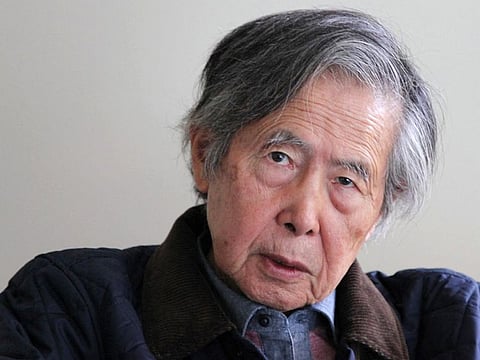Polarising ex-Peruvian president Alberto Fujimori dies at 86
Fujimori was adored and reviled in equal measures in Peru

Lima: Peru's former president Alberto Fujimori, who spent 16 years in prison for crimes against humanity, died on Wednesday at the age of 86 in the capital Lima, his family said.
"After a long battle with cancer, our father, Alberto Fujimori, has just departed to meet the Lord," his children Keiko, Hiro, Sachie and Kenji Fujimori wrote on the social media platform X.
"We ask those who loved him to join us in praying for the eternal rest of his soul," they wrote, adding: "Thank you for so much, Dad!".
Fujimori, who led Peru from 1990 to 2000, was released from prison on humanitarian grounds in December, two-thirds of the way through a 25-year sentence for crimes against humanity during his rule.
Sources close to his family told AFP earlier Wednesday that his health had deteriorated rapidly after completing treatment for tongue cancer in August.
He was last seen in public on Thursday as he was leaving a clinic in the Miraflores district of Lima, where he said he had undergone a CT scan.
The news of his death spread quickly on social media, where his supporters and detractors quarrelled over his legacy.
Just a month earlier his daughter Keiko had announced that the rightwinger would run for president again in 2026.
Prime Minister Gustavo Adrianzen expressed his condolences to the Fujimori family. "We want his children and relatives to know we feel sorrow," he said.
Adrianzen said he would talk to the family about what kind of funeral they want. It was not clear whether Fujimori would receive a state funeral.
Fujimori, who was of Japanese heritage, was sent to prison in 2009 over massacres committed by army death squads in 1991 and 1992 in which 25 people, including a child, were killed in what he presented as anti-terrorist operations.
In December 2017, then-president Pedro Pablo Kuczynski pardoned Fujimori due to his ill health.
But the Supreme Court later annulled the pardon and in January 2019, he was returned to jail from hospital.
Hostage crisis
He was released again in December 2023 after a court reinstated his pardon.
He was adored and reviled in equal measures in Peru.
His supporters credited him with saving the country from left-wing Shining Path and Tupac Amaru guerrillas and shoring up the economy.
His opponents saw him as a power-thirsty autocrat.
One of the most dramatic episodes of his presidency was a four-month hostage ordeal at the Japanese embassy in Lima in late 1996-early 1997.
The standoff ended with Fujimori sending in commandos who rescued all 72 hostages and killed 14 rebels.
But the later Fujimori years were dominated by a bribery scandal involving his intelligence chief Vladimiro Montesinos.
Fujimori went into self-imposed exile in Japan and memorably faxed in his resignation but was arrested years later in Chile and sent back to Peru for trial.
His daughter Keiko has made three failed bids for the presidency.
Sign up for the Daily Briefing
Get the latest news and updates straight to your inbox



